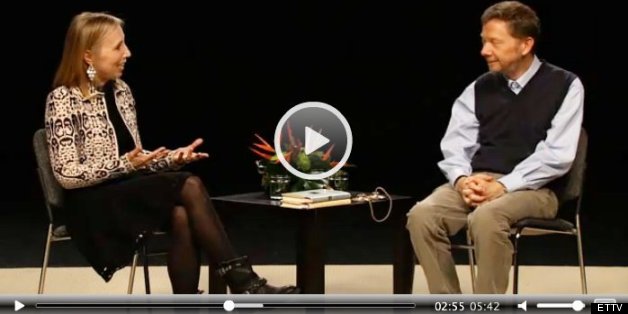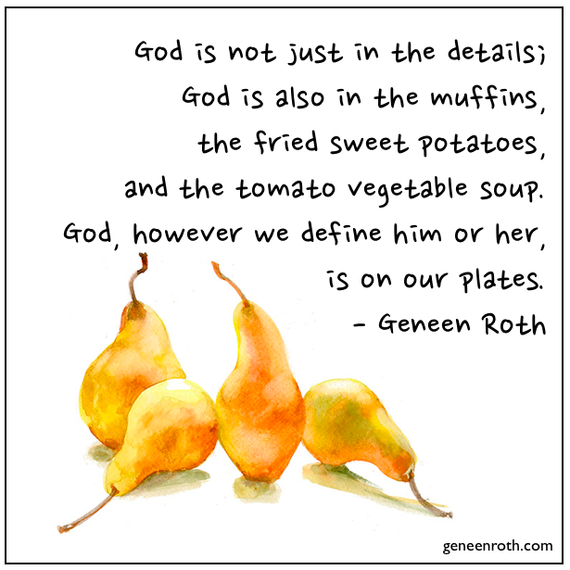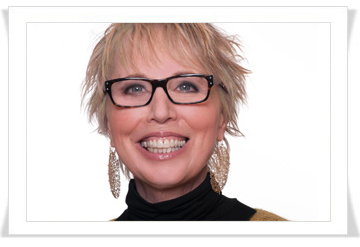On any given day, Geneen Roth spends a considerable amount of time listening to people question their own actions. People often arrive at her popular retreats feeling fed up, depressed, ignored, and just plain not good enough.
Her students' lives are deeply affected by what she refers to as "not-enoughness," especially when it comes to food and money. They worry about whether they are thin enough. They worry about whether or not they have enough money, or even worry that they have too much. They worry about the shame, greed and pain associated with money and its effects on their lives. Geneen explains that, "once you internalize that lack of sufficiency, and you tell yourself that you don't have enough value, overeating and shopping become a substitute for that feeling of enoughness."
Geneen understands these worries deeply. The best-selling author of Women Food and God and Lost and Found, she has an intrinsic and heartfelt empathy for her students' perceptions, grounded in her 17 years of struggling with eating disorders and then her own dramatic and sudden reversal of financial wealth.
In 2008, Geneen was affected by an investment debacle linked to the actions of one of the most respected financiers in the United States at the time: Bernie Madoff. Perpetuating a fraud called "extraordinarily evil," "unprecedented" and "staggering" by the judge in the resultant criminal trial, Madoff was responsible for the loss of US$20B of his clients' funds. Geneen was one of those clients. When Madoff's Ponzi scheme was exposed, 30 years' worth of Geneen's own life's savings were gone in an instant. As she says, "I didn't even have the money to pay the mortgage. I didn't know how we were going to live and where we were going to live."
In our time together, Geneen repeatedly points out that although her newest book centers on money, she is not a financial expert. Her goal in Lost and Found, instead, was to explore the meaning of money in our lives and why most of us feel that we can't get enough. Using her own financial crisis as a touchstone for that exploration, Geneen explains that it was the intensity of her experience that forced her to reside in the present moment.
Unpredictably, her loss presented her with the gift of joy, peace, and contentment. As she describes this transition, her financial breakdown was what Eckhart Tolle calls a critical limit situation: not a life-threatening catastrophe, but given the scale of what could happen to a person on a daily basis, overwhelming. Geneen says that, "I was fortunate enough to have people in my life who guided me back to the understand that nothing of value had been lost -- although, in the first few days, I said to each of them that "now is not the time to be spiritual!"
Within days after the fraud was revealed, however, Geneen perceived that there was no challenge, critical or not, that had the power to obstruct her connection to the present moment and to her spiritual foundation. As she explains, "I saw that very quickly; I was able to understand the truth. Whenever I started blaming myself and others, I was able to bring myself back to this moment, to now, and when I did, I saw that nothing was wrong."
As Geneen explains, we often compartmentalize the idea of money and the idea of consciousness separately, which results in a lack of awareness about how we use and manage money. We can all suffer from this challenge, whether or not we know it is happening.
For example, Geneen demonstrates that, for some of us, eating and shopping are the only ways that we allow ourselves to have what we want. At the same time, since it's not food or consumer goods we truly need, we end up feeling empty. This sense of insufficiency frustrates our efforts to feel good about ourselves. Nothing we eat, buy or own is likely to fill that void if we feel that we not enough, or if we feel that we are not valued.
Awareness about money doesn't mean that we have to turn to self-repression or self-indulgence, however. Instead, Geneen suggests that we can use our relationship with money as a doorway to awareness. When we suffer hardships, as Geneen has, we are more inclined to pay attention, but building awareness is something that we need to work towards no matter what we experience in life.
As she explains, "There isn't a situation that has the power to determine or to take away our focus on presence." Geneen writes that there is something better than the illusion of safety that money creates, which involves "knowing your own mind, contacting your own heart. Telling the truth. Being willing to be uncomfortable. Understanding that feelings won't kill you."
There is a deep connection between Eckhart Tolle's core teachings and the real-life challenges explored in Geneen Roth's nine books. Her first-hand accounts of her own journey towards consciousness bring Eckhart's teachings to life. Thirty years of writing and sharing her personal narrative, and teaching both in person and through her online retreats, have given Geneen a depth of experience in understanding the practical barriers that prevent us from finding presence.
As Geneen told me, the first step to consciousness is: "Be interested. Pay attention with kindness. Be curious and open."
She knows that in developing consciousness, change may be slow, but as Geneen says, the possibilities are both endless and exhilarating.
For more information on Geneen Roth, please click here.
For more information on Eckhart Tolle, please click here.


